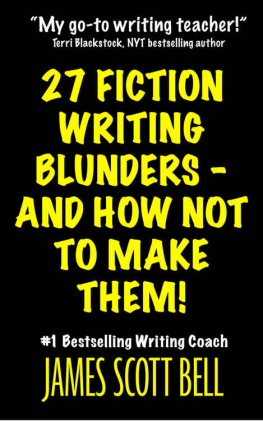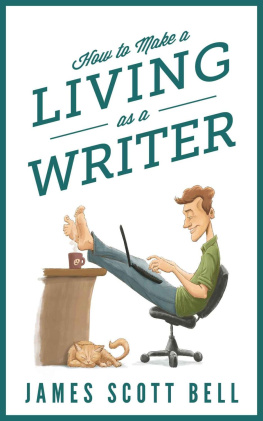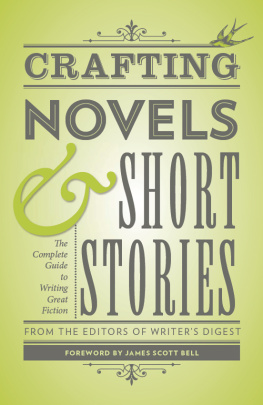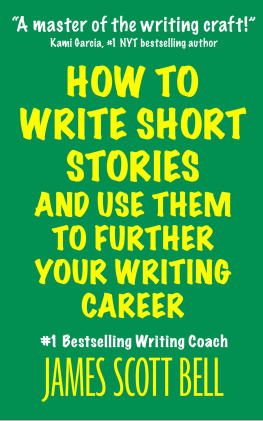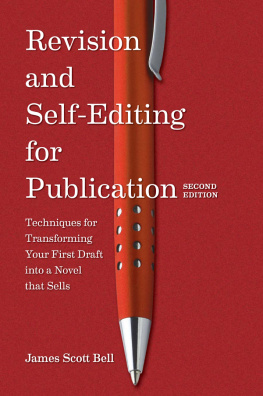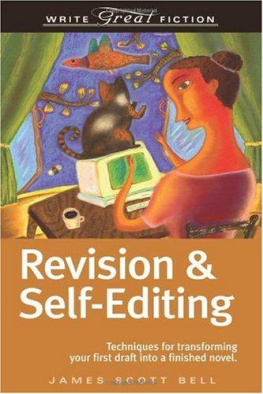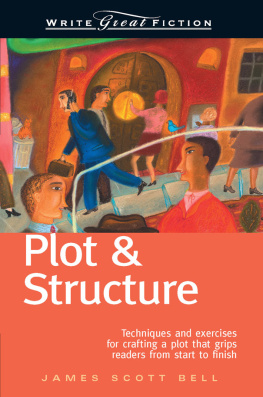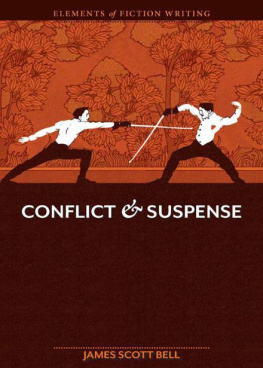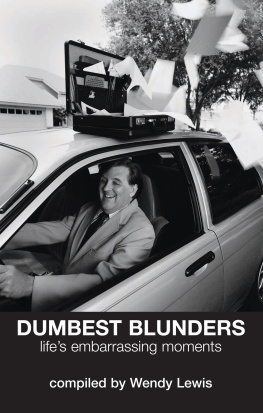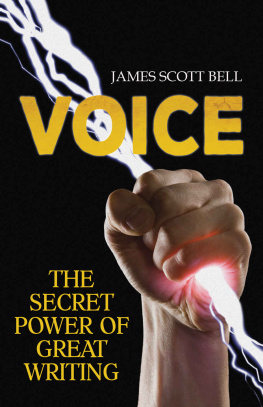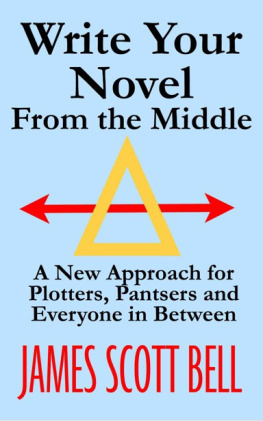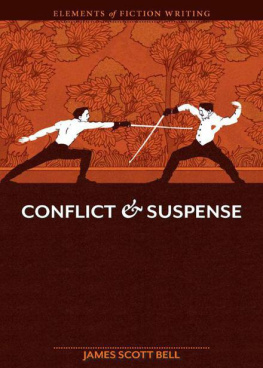James Scott Bell - 27 Fiction Writing Blunders - And How Not To Make Them
Here you can read online James Scott Bell - 27 Fiction Writing Blunders - And How Not To Make Them full text of the book (entire story) in english for free. Download pdf and epub, get meaning, cover and reviews about this ebook. year: 0, genre: Detective and thriller. Description of the work, (preface) as well as reviews are available. Best literature library LitArk.com created for fans of good reading and offers a wide selection of genres:
Romance novel
Science fiction
Adventure
Detective
Science
History
Home and family
Prose
Art
Politics
Computer
Non-fiction
Religion
Business
Children
Humor
Choose a favorite category and find really read worthwhile books. Enjoy immersion in the world of imagination, feel the emotions of the characters or learn something new for yourself, make an fascinating discovery.
- Book:27 Fiction Writing Blunders - And How Not To Make Them
- Author:
- Genre:
- Year:0
- Rating:4 / 5
- Favourites:Add to favourites
- Your mark:
- 80
- 1
- 2
- 3
- 4
- 5
27 Fiction Writing Blunders - And How Not To Make Them: summary, description and annotation
We offer to read an annotation, description, summary or preface (depends on what the author of the book "27 Fiction Writing Blunders - And How Not To Make Them" wrote himself). If you haven't found the necessary information about the book — write in the comments, we will try to find it.
27 Fiction Writing Blunders - And How Not To Make Them — read online for free the complete book (whole text) full work
Below is the text of the book, divided by pages. System saving the place of the last page read, allows you to conveniently read the book "27 Fiction Writing Blunders - And How Not To Make Them" online for free, without having to search again every time where you left off. Put a bookmark, and you can go to the page where you finished reading at any time.
Font size:
Interval:
Bookmark:
27 Fiction Writing Blunders And How Not To Make Them!
James Scott Bell
#1 Bestselling Writing Coach
Copyright 2015
James Scott Bell
All Rights Reserved
Compendium Press
Woodland Hills, CA
Avoiding the Flubs of Fiction
They see them all day long.
Agents and editorswhose job it is to find authors and manuscripts of promiseare used to spotting the most common errors of fiction writers. These mistakes, most of which are easily avoidable, spell probable doom for a project under consideration.
Readers see these errors, too. While most readers are not schooled in the craft of fiction, they nevertheless feel something is off. Their reading pleasure is dampened. If that happens too much, they are less likely to finish the book.
Or seek out another from the same writer.
When I teach workshops, I refer to these blunders as speed bumps. If youre taking a nice drive through beautiful country, you luxuriate in the view. You dont think about the road. You dont think much at all. You enjoy.
But if you hit a speed bump, it jolts you out of your reverie. It then takes you several moments to get back into flow, into enjoying the view once more.
But what if another speed bump comes along?
Then another?
In fact, what if this whole stretch of road is filled with bumps and potholes and the occasional traffic-blocking cow?
You dont enjoy the drive at all! You get irritated. You go home and yell at the dog.
To help save the dogs, make it your aim to keep readers entranced. You want to put them into a dreamlike state, so when they are reading the story they are not even conscious of reading; they are only conscious of experiencing.
Weve all read books that did that for us. And we also know how rare it is. I remember the first time it happened to me. It was reading a Classics Illustrated comic book. These were a staple of my youth, wonderful renderings of classic books in comic book form.
The one that enraptured me was The Hunchback of Notre Dame. I still remember the emotional impact when I finished it.
Later, when I started reading actual novels, I was caught up in stories like Tarzan of the Apes and Dune.
You have your favorite titles, too.
And as a writer, you want readers to feel the same way.
Which means writing with voice and passion and craft and careand learning to recognize and eliminate those dang speed bumps!
In my book, How to Make a Living as a Writer, I included a chapter on the five biggest fiction writing mistakes. It was hard to keep it to five, but for the sake of brevity I did so.
But I kept thinking of more blunders writers need to identify, more speed bumps to be eradicated. So Ive expanded my thoughts on the five blunders in Living and have added 22 more.
Included in this new list are some bumps in your approach to writing. The goal is to give you a better writing life, because its not always easy. But you already know that. As David Eddings once put it, Keep working. Keep trying. Keep believing. You still might not make it, but at least you gave it your best shot. If you don't have calluses on your soul, this isn't for you. Take up knitting instead.
I want this book to help you take your best shot and smooth out some of those calluses.
Let the ride begin.
1. Letting Fear Get a Foothold
All writers get the willies.
You dont get very far in the writing life without some shakes about your progress and prospects.
And no matter how much success you manage to achieve, theres always a part of you where fear tries to pitch a tent.
So what do you do?
The only thing you can do, and were meant to do: write your way out of it.
Emerson once said: Do the thing you fear, and the death of fear is certain.
Journal It
When fear steps in with a megaphone, sit down and write about it. Putting your fear on paper (or screen) is one way to lessen its power.
Start a journal. Identify the roots of your fear. So much of the time fear comes from what certain chuckleheads have told you over the years. Maybe when you were in school and that idiot teacher said you didn't have what it takes to be a writer, so you should probably consider taking shop.
Or maybe it was an early critique group you attended, and the Mussolini of the group told you how many rules you broke in that page you spent so much time on.
Maybe it's hearing all the stories about how hard it is to be a writer, how difficult it is to be discovered, and, if discovered, break out.
Maybe you just are worried about starting on a journey that could very well lead you off a cliff.
Well here's the thing: there is no cliff. And even if there were, you would do as Ray Bradbury counseleddevelop wings.
There is no failure in writing.
Unless you quit. Which you wont. Ever. (See )
Keep Learning
Another thing you can do when fear hits is to go out and learn something.
I still find it exciting to build up my craft. There is no limitation on learning except that which you place upon yourself.
Maybe you fear you don't have the ability to write. If you know the English language well enough to hold a conversation with someone about more than what coffee to order at Starbucks, you have the ability to write.
Self Talk
Much of our fear is contained on an MP3 file in our head. It plays certain tracks over and over, like a favorites list of anxieties. Song titles such as:
I Told You You Cant Write
Who Are You Trying to Fool?
Youll Never Make It and You Cant Even Fake It
The Long and Winding Road is Too Doggone Hard
If I Only Had a Trust Fund
The thing about these tracks is that theyre deeply planted. You cant really erase them, but you can override themwith self talk.
Turn up the volume on positive talk.
Write your own one liners.
Start with: I can do this!
Say that to yourself twelve times, emphasizing a different word each time.
I can do this!
I can do this!
I can do this!
I can do this!
Heres a little Neuro-linguistic programming (NLP) tip: Embed that self talk with a visual and a physical move.
The visual is something you dream up. Its a picture of yourself as a successful writer. What would that look like? Work on the picture until you feel it.
See your book listed as a #1 bestseller on Amazon.
See yourself on a panel of famous authors.
See an audience in rapt attention as you tell them about your latest book.
Got it? Now connect that feeling with a physical action. Something quick and definite. Like whapping your open palm with your fist (not so hard that it hurts!).
As you hit your palm, see that vision. Feel that feeling.
Practice that several times.
The next time you sit down to write, repeat the action. NLP recognizes that our physical and mental states are connected. The fist whap will bring back the feeling.
Which means you dont have to let your fears control you. You can knock them out proactively.
When it comes to fear, the only questions are: do you have the will to write, the desire to write, and the grit to stay with it? All that is a matter of decision. You can decide to be a writer, and no one else can tell you that youre not.
Write the thing you fear, and the death of fear is certain.
2. Putting Readers in the Tar Pits
Out here where I live, Los Angeles, we have a spot called the La Brea Tar Pits. My grandmother took me there when I was a boy. She told me that these big old dinosaurs would step into the pits and get stuck. The more they struggled, the faster theyd get sucked down.
Font size:
Interval:
Bookmark:
Similar books «27 Fiction Writing Blunders - And How Not To Make Them»
Look at similar books to 27 Fiction Writing Blunders - And How Not To Make Them. We have selected literature similar in name and meaning in the hope of providing readers with more options to find new, interesting, not yet read works.
Discussion, reviews of the book 27 Fiction Writing Blunders - And How Not To Make Them and just readers' own opinions. Leave your comments, write what you think about the work, its meaning or the main characters. Specify what exactly you liked and what you didn't like, and why you think so.

